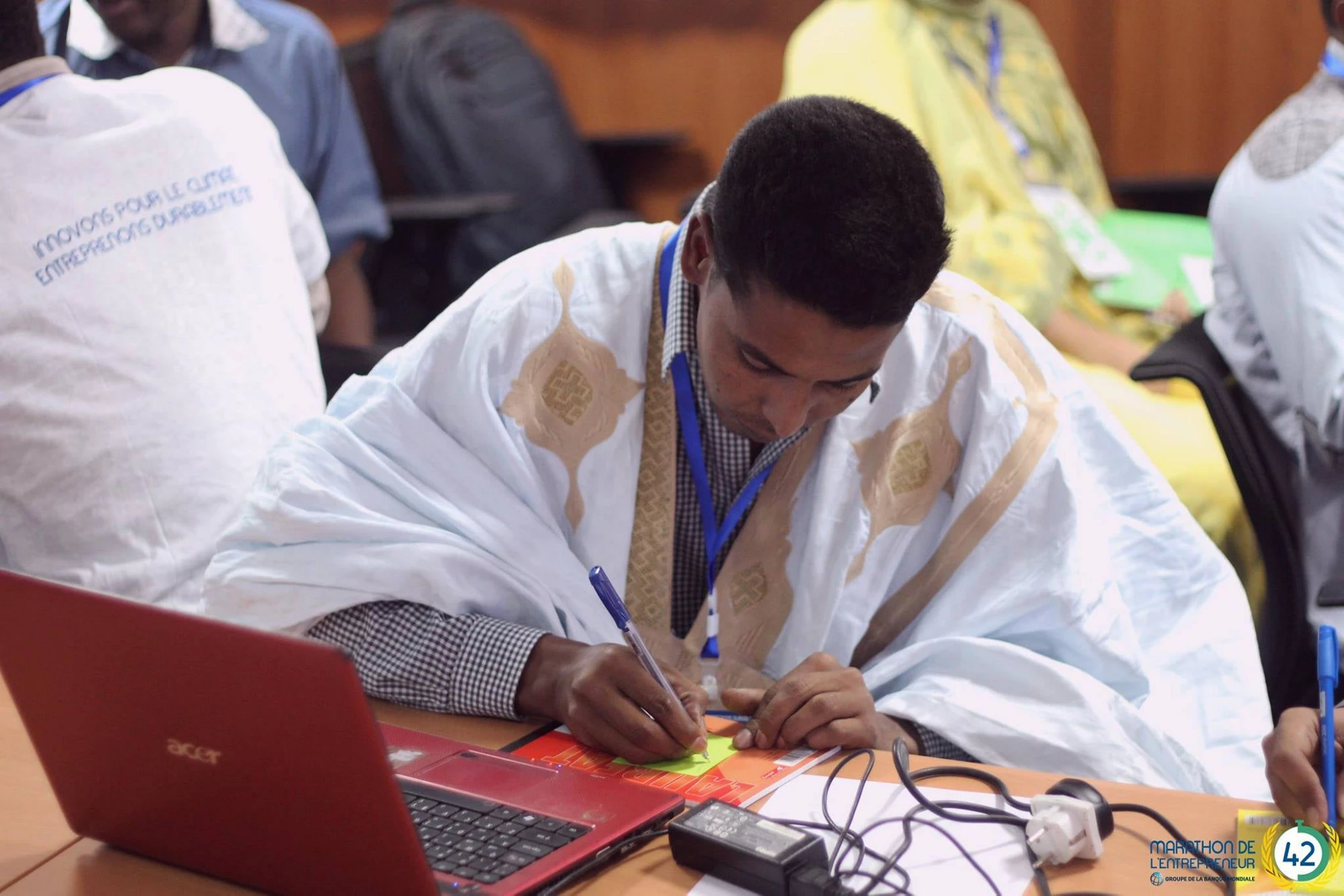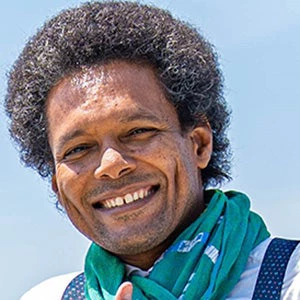
Babah Salekna El Moustapha, co-founder of the project Mauritanian Society for the Typha Coal Industry (SMICT) with Mohamed and Moctar Abdallahi Kattar. Photo Credit: Moussa Traoré, HADINA.
“Innovate for the climate. Work sustainably.” This slogan launched the call for applications to World Bank Group’s latest entrepreneurship support initiative in Mauritania, the Entrepreneur’s Marathon — a country-wide competition to identify and accompany a new generation of entrepreneurs.
This competition is an initiative of the World Bank Group in partnership with the Ministry of the Economy and Finance and Mauritanian incubator Hadina RIMTIC (ICT in the Islamic Republic of Mauritania) acting as the central vehicle through which public and donor support can be channeled into Mauritania’s aspiring entrepreneurs.
The competition is accompanying 21 new or young start-ups and businesses, providing them with training, coaching and other incubation services that will help them develop a final business plan and provide evidence for the hypotheses underpinning their business idea.
Whittling down a nationwide call for proposals from more than 200 applications, the Entrepreneur’s Marathon invited the top 21 teams to participate in the 42-day Marathon, which is taking place right now. Applicants had to propose business ideas to mitigate climate change, with a special emphasis on alternative sources of energy. The application period also included a strong outreach campaign — the Entrepreneur’s Convoy — that travelled around the country targeting schools, universities and training and youth centers in the main urban areas. Four of those urban areas are located in the rural south, which has already been considerably affected by climate change.
“The Entrepreneur’s Marathon couldn’t come at a better time,” says Mariem Ba, Hadina’s communications officer. “It proves that we can go beyond education and raising awareness of the importance of fighting climate change by actually supporting and incubating private sector initiatives that address the environment.”
The program also enjoys the support of the Green Competitiveness Launchpad, an initiative by the World Bank Group’s infoDev program that helps growth-oriented SMEs bring their technological solutions to mitigate climate change to scale and adapt their innovations to developing countries. The project specifically targets green start-ups and businesses in Mauritania to stimulate youth entrepreneurship and the generation of clean-tech jobs through private-sector ventures that address the impacts of climate change.
To kick-start the program, Hadina hosted a three-day Boot Camp in June in the capital, Nouakchott, to prepare the selected teams for the Marathon. Teams were given the opportunity to present their projects and benefit from presentations on business and entrepreneurship models, as well as to get ideas and to network with successful Mauritanian entrepreneurs who operate locally or who have found success as part of the diaspora.
The days when entrepreneurship was sneered at by the general public as an unreliable, and even illegitimate, source of income are fast receding in Mauritania, as demonstrated by the enthusiasm and motivation of the teams to present, improve and implement their ideas. Where they will need support, however, is in developing the necessary skillset to understand their target markets, analyze the underlying dynamics and respond accordingly.
“This is exactly where we can see incubators like Hadina playing a key role, filling the skills gap and early-financing gap that so many entrepreneurs throughout the Sahel suffer from,” noted World Bank Country Manager for Mauritania, Laurent Msellati, who applauded the initiative. “The Entrepreneur’s Marathon could have an important demonstration effect for similar initiatives in the sub-region.” It is hoped that the competition could prototype a new method for incubators to facilitate entrepreneurship across the Sahel, particularly in Chad, Mali and Niger where the business environments are comparable to Mauritania’s.
The Entrepreneur’s Marathon sets itself apart from other entrepreneurship competitions in Mauritania by providing beneficiaries with US$ 600 to empirically test aspects of their business plan — for example, by prototyping a product or conducting targeted market research. Indeed, practical application and continuous capacity-building support are the driving principles of the Marathon, emphasizing real-life experience and realities on the ground for Mauritanian entrepreneurs. Forcing participants to immediately confront their environment and consider how they would react to existing market constraints will encourage them to sharpen their assumptions and ground their businesses in reality, increasing their chances of success.
Once they have completed the marathon, four winning teams will be selected for awards in the categories of business-plan development, practical application, fighting climate change and promoting women’s entrepreneurship, with prizes of MRO 1,000,000 (US$ 2,780) each. The prizes will be announced during Entrepreneur’s Week from July 18 to 19, which will also bring entrepreneurs, public officials, investors, academics and development partners together to discuss the many opportunities and remaining obstacles for the Mauritanian private sector.
Increasingly recognized as a strategic path to economic growth, supporting SMEs and entrepreneurs in Mauritania will have important development impacts. By emphasizing practical application and using incubators as the key implementation partner to house multi-faceted support services, the Entrepreneur’s Marathon is an excellent platform upon which to showcase this potential. Generating lessons learned and best practices on encouraging youth and green-tech entrepreneurship, the competition could prove a model for the wider sub-region and perhaps Africa as a whole.



Join the Conversation